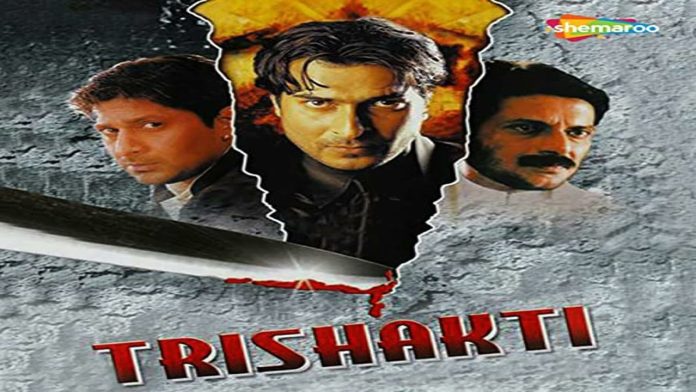TRISHAKTI
Bollywood Creations’ Trishakti (A) is about three street-smart young men who get embroiled between the two warring gangsters in the city. There are also a two-timing policeman and a home minister. The subject has nothing to thrill, inspire or entertain. The screenplay is made up of predictably contrived incidents, and the dialogues are good only at places. The drama becomes a little interesting towards the concluding reels and culminates into a climax which provides some shock value.
Milind Gunaji is okay. Sharad Kapoor is fair. Arshad Warsi is quite entertaining. Ashish Vidyarthi, as the dominating don, has done well. Govind Namdeo, as Ashish Vidyarthi’s rival, stands out with a lovely performance, giving his villainy a comic touch. Radhika, who plays the female lead, has an insignificant role and she is just about okay. Jatin Kanakia, Tej Sapru, Vishwajeet Pradhan, Shehzaad Khan, Tiku Talsania and Himani Shivpuri are average. Sadashiv Amarapurkar impresses as the two-timing police officer.
Direction (Madhur Bhandarkar) is a fair debut attempt. Musically, two of the four songs help to develop the drama. Action scenes are many but they lack thrill. Production values are okay. Cinematography and other technical aspects are passable.
On the whole, Trishakti, without the required support of face value, and devoid of novelty, is a weak fare.
Released on 6-8-’99 at Alankar and 16 other cinemas of Bombay thru Dilsa Distributors Combine. Publicity: average. Opening: dull. …….Also released all over.
‘TAAL’ MIXING COMPLETED TODAY MORNING
Mixing of writer-producer-director Subhash Ghai’s Taal concluded at 4 o’clock this morning (August 7) at Empire Audio Centre. The first copy will be out this evening. The film stars Anil Kapoor, Akshaye Khanna and Aishwarya Rai. Music is scored by A.R. Rahman and lyrics are penned by Anand Bakshi. The film, certified for universal exhibition, is due to release all over on 12th August.
‘SARFAROSH’ CELEBRATES 100 DAYS
Cinematt Pictures’ Sarfarosh, with which John Mathew Matthan made his debut as producer, director and writer, completes 100 days today (7th August) at Maratha Mandir and Metro (matinee), Bombay. The film stars Aamir Khan, Sonali Bendre, Naseeruddin Shah and Mukesh Rishi.
‘KACHCHE DHAAGE’ SILVER JUBILEE
Tips Films P. Ltd.’s Kachche Dhaage entered silver jubilee week on 6th August at Imperial (matinee), Bombay. Starring Ajay Devgan, Saif Ali Khan, Manisha Koirala and Namrata Shirodkar, the film marked the debut of director Milan Luthria. Late Nusrat Fateh Ali Khan’s music, Anand Bakshi’s lyrics and Tinu Verma’s action are the film’s high points.
N. CHANDRA ARRESTED, RELEASED ON BAIL
Producer-director N. Chandra was arrested on 3rd August by the Juhu police at his office at Juhu, Bombay, in a case filed by producer Milan Jhaveri under the Negotiable Instruments Act. The arrest warrant was issued by Justice Shalini Gaikwad of the Girgaum (Bombay) court following a suit filed by the producer.
Milan Jhaveri had alleged that he had made a payment to N. Chandra as signing amount about four years back. Since the project, for which N. Chandra was signed, could not make any headway, Chandra returned a part of the amount by cheques which were subsequently returned unpaid by the bank. Jhaveri, therefore, filed a suit against Chandra in the court. The court issued summons but Chandra failed to appear in the court which, therefore, issued an arrest warrant. Chandra was freed on bail the same day.
FIVE ‘A1’ FILMS AT GWALIOR
Chor Machaye Shor – 43 days – Filmistan – 1,10,233.40.
Gupt Gyan – 42 days – Roxy – 82,995.43.
Prem Nagar – 56 days – Yadav – 1,19,913.59.
Aap Ki Kasam – 45 days – Delite – 82,924.34.
Dost – 42 days – Krishna 84,636.34.
‘A1’ films are now not running for more than 6/8 weeks.
YOU ASKED IT
Sunny Deol starrer Pyaar Koi Khel Nahin did not take a very good start at most of the places. What about Sunny’s next, Arjun Pandit, which will be released on 20th August?
– The two films can’t be compared merely because they are Sunny starrers. The main difference between them is that the former has no action while the latter has a good dose of action — and this difference is evident in the promotional trailers of the two films, the titles and the overall packaging of the two. Since Sunny has an action image, ARJUN PADIT should take a flying start. More so, because its trailers are being loved by the audience.
What is the ratio of Mohabbatein likely to be?
– Even Yash Chopra may not have finalised the ratio of the film as yet. But he is one of the very few makers who doesn’t go overboard while fixing the ratios of his films. Even when he could have asked for 2.5 for DTPH, he sold it for 2.
Why do you keep saying that it is prices and not films which are failing?
– Because in the case of most of the big banner films, the ratios (prices) are unreasonably high. Producers demand (and get) prices which leave them with a profit margin of 6 to 10 crores a film and if such films are not able to cover their (high) price, it is perfect to say that it is the price and not the film which has bombed.
CENSOR NEWS
Mukta Arts P. Ltd.’s Taal was given C.C. No. CIL/1/39/99 (U) dt. 3-8-’99; length 5062.32 metres in 19 reels (cuts: 7.12 metres).
Ratan International’s Arjun Pandit was given C.C. No. CIL/3/36/99 (A) dt. 6-8-’99; length 4298.11 metres in 16 reels (cuts: 152.95 metres).
Navadarshan Productions’ Tu Hi Meri Ganga was given C.C. (in Hyderabad) No. CIL/36/43/99 (U) dt. 16-7-’99; length 3002.69 metres in 13 reels (cuts: 61.61 metres).
Victory Films Enterprises’ Aakhir Hai Kaun? was seen on 2nd.
Sachi Arts’ Dulhan Banee Daayan was seen on 4th.
N.P. International’s Khooni Mahal (revised; length 3076.33 metres in 14 reels), applied on 2nd, was seen on 5th.
Vishesh Films P. Ltd.’s Sangharsh (length 3849.65 metres in 15 reels) was applied on 6th.
DO YOU KNOW?
* Vasant Talkies, Amravati is the only cinema in C.P.C.I. Rajasthan where SARFAROSH has completed 100 days. The film’s distributors permitted the students of Tapovan, a leprosy mission in Amravati, to see the film at a concessional admission rate of Rs. 3 per head.
* The inmates of the home for the aged, widows of various mahila ashrams, deserted wives and orphans belonging to various associations/shelter homes in Gujarat are being notified by producers K.P. Patel and S.K. Patel that they do not have to pay a single naya paisa to see their Gujarati film, MAA TE MAA BIJA VAGDA NA VAA anywhere in Gujarat. The film, directed by Amar Kumar (Danny), is slated for release on August 13.
MIX MASALA
SOME JUSTICE, THIS!
The producer and the C.I. distributor of Nyaydaata are apt to cry, and cry out aloud, “Is this justice (nyay)?!?” The film was released on 5th August at Indore’s Chandragupta and in the first show, it could collect a paltry Rs. 452 against a capacity of about 20,000/-! With the audience verdict delivered, the film made an exit the very day it was released. Which means, the first day of the film proved to be its last day too! Like a batsman bowled out in the first ball!! The next day, Cheetah was released at the cinema.
Cut This Censor Problem!
Rightly had Shekhar Kapur launched a broadside against the Central Board of Film Certification (CBFC) which offered his Elizabeth three cuts. The rationale behind his fight against the censors was, in his own words, to break the jaane-bhi-do attitude of filmmakers. It is another thing that as an afterthought, Shekhar has chosen to tone down his ire against the CBFC.
Producers have for years now often been accepting the idiosyncrasies of the CBFC not because they agree with its (CBFC) thinking but because they’d rather let it pass simply as they either don’t have the time to get into a battle with the CBFC or don’t have the money for it or, in several cases, don’t have the inclination. Shekhar Kapur may not be right in arguing that since a film made by an Indian has been seen the world over, the Indian censors should also permit its screening in toto. But he was definitely right in saying that he would not accept any cut, howsoever small or irrelevant, simply because he was convinced that the interpretation of the censor guidelines was archaic. By saying so, Shekhar hit the nail on the head.
For too long now, the industry has been crying hoarse that the censor guidelines are outdated, but nothing seems to have come out of its protests. One must realise that censorship is and will always remain a subjective issue and the guidelines do give a free hand to those who view films for the purpose of censorship. The dictionary meaning of the word ‘guideline’ is ‘directing principle’. So the fault lies more in the interpretation and application of the guidelines by the powers-that-be than with the rules themselves.The industry needs to address itself to this problem of interpretation/application.
Mahesh Bhatt last year fought a lone battle to obtain a censor certificate for his Zakhm. That he finally succeeded may not have given him as much joy as the recent National Award his film received. The slap on the face of the CBFC must’ve bruised its ego more than anything else because the National Award to Zakhm was for the best film on national integration whereas it (CBFC) had straightaway referred the film to the home ministry as, in its esteemed opinion, the film could have served to incite communal feelings if it was allowed to be released. So much for the CBFC’s objective interpretation of censor guidelines! A pertinent point raised by Shekhar Kapur may be mentioned here. According to him, the problem arises because nobody in the CBFC wants to take responsibility for clearing a film that may seem even remotely controversial. If such films have ultimately to be passed by the courts because of this passing-the-buck game, why at all have the fare called CBFC?
Very often, producers are so hard-pressed for time that they’d rather accept the cuts offered by the CBFC, even if they don’t agree with them, than oppose them. Quite often, the rationale behind accepting the cuts is that they (cuts) may not be perceived to adversely affect the film’s box-office performance. A classic example of the jaane-bhi do attitude of filmmakers! Subhash Ghai’s acceptance of a cut ordered by the CBFC in Taal, perhaps, falls under the aforesaid category. The CBFC found the words ‘Manikchand Group’, visible in a song sequence of the film, as surrogate advertising for Manikchand pan masala and ordered their removal. At least a maker of Ghai’s calibre should have put his foot down and not given in to the prudish demand of the CBFC, simply because it doesn’t appeal to common sense or logic that Manikchand Group, which manufactures many other products, means the same thing as Manikchand pan masala. One did not expect Subhash Ghai to take things lying down like that.
The industry needs more Shekhar Kapurs and Mahesh Bhatts. May their tribe increase!
– KOMAL NAHTA
3-E
Education-Entertainment-Enlightenment
Roads To Hell
Agreed that the film trade is full of ups and downs, but need that fact be reflected so harshly in the roads leading to Naaz building? For years now, every road that leads to the building has been deteriorating at a consistent rate. The number of potholes on each road also seems to be growing at an alarming rate. Keeping in mind the rate at which films flop nowadays, someone very rightly remarked that, perhaps, the roads serve to remind the eternally hit-starved producers and distributors of the Khud-daar song: Oonche neeche raaste aur manzil teri door.
Red Tapism In Film Imports
The CBFC seems to be loving the prospect of duplication of work. Or rather, let us put it this way: the I & B ministry would like the CBFC to do the same work twice over. Don’t believe it? Here’s how. When a private importer wants to import a foreign film into India, he has to first obtain an NOC (no objection certificate) from CBFC’s administrative officer for the import. The administrative officer relies upon the application of the prospective importer and a review of the film printed in any foreign magazine. Based on these, he forms an opinion about whether or not the film is suitable for import and, if convinced, he gives the NOC to the applicant! Why should the NOC at all be necessary is something which one doesn’t understand because, in any case, the film cannot be released anywhere in the country before it is censored by the CBFC. Even if that may be passed off as one of the bureaucratic idiosyncrasies, the fact remains that getting the NOC from the administrative officer is quite often a Herculean task — especially when he is on leave. It appears that the CBFC rarely, if ever, deputes anyone else in the officer’s place while he is on leave. In such cases, the importer ends up waiting agonisingly for the officer to return to his duty. In any case, why should the CBFC decide twice whether or not the film can be imported — first, without seeing the film, and again, after seeing it. Besides, it is not rare for the CBFC’s administrative officer to issue an NOC (thereby certifying that the film is appropriate for import) and later for the same CBFC to ban the said film (implying thereby that the imported films is inappropriate for screening in India). This is India!
‘Manikchand’? Naapasand!
Yet one more example of how difficult the censors can act. The regional officer of the CBFC, Bombay, Sanjeevani Kutty, objected to the display of the word ‘Manikchand’ in a song of Taal, censored recently. Since the censor guidelines mention that scenes tending to encourage, justify or glamorise consumption of tobacco or smoking should not be shown in a film, the regional officer (RO) ordered the word ‘Manikchand’ to be deleted as Manikchand are the manufacturers of pan masala. When producer-director Subhash Ghai tried to reason out that the words shown on screen were ‘Manikchand group’ and that the group manufactured many other things besides pan masala, the RO declined to accept the argument. Kutty’s argument was that although the words pan masala or gutkha were not used, the very mention of ‘Manikchand’ was tantamount to surrogate advertising. Ghai reminded Kutty that Doordarshan had aired a film awards function sponsored by Manikchand group, in which the banner of Manikchand group was shown, but that argument too was sidelined. Ultimately, ‘Manikchand Group’ had to be chopped off in the name of surrogate advertising. Ridiculous, did you say?!?
News From Overseas
Some heartening and some not-so-heartening news from across the border:
The music of Subhash Ghai’s Taal is creating ripples in the USA and the UK. It is the no. 1 selling audio cassette abroad today.
And now the bad news: The stage show in London on 31st July had to be stopped midway because of tension that erupted while Sonu Nigam was singing the Sandese aate hain song from Border. The show had Karisma Kapoor, Akshay Kumar, Raveena Tandon and others performing.
Hit Music Score
One music that’s bound to click in a big way is A.R. Rahman’s score in Jhamu Sughand and Deepa Mehta’s 1947 Earth. The Rut aa gayee re song, rendered by Sukhwinder Singh and chorus, will soon become a rage in the entire nation. It has a very earthy flavour and a tune that could make one simply swing to it. The other number that should be lapped up by the audience in a big way is the Banno song. This one has Sadhana Sargam lending her mellifluous voice alongwith chorus singers. It is another excellent number.
A Couple Of Hat-Tricks
With the National Award for his lyrics in Godmother (1998), Javed Akhtar has completed a hat-trick. For, this is his third consecutive National Award. He bagged one in 1996 for Saaz and the next year (1997) for Border. The only other person to have completed a similar hat-trick is Javed’s wife, Shabana Azmi. She picked up National Awards for the best actress in three consecutive years in the ‘eighties — for Arth in 1983, for Khandhar in 1984 and for Paar in 1985. What’s that they say about it all being in the family? And what’s that famous saying which goes: Behind every successful man, there’s a woman. Rephrased, it could read thus in this case: Before every successful man, there’s an equally successful woman.
Pitting ‘Pardes’ Against ‘Taal’
Subhash Ghai is angry with STAR TV. For, the channel was planning to do something that they were well within their legal rights to do but which appeared too unethical to be true. STAR, which holds the satellite rights of Ghai’s Pardes, planned to air the film on 14th August, a day after the release of Ghai’s new film, Taal. Obviously, the intention was to cash in on the publicity of Taal, besides, of course, the relevance of the film to the Independence Day (15th August). But in cashing in on the publicity of Subhash Ghai’s Taal, the channel would, perhaps, also be cutting into the revenues of the same film because a free Pardes on television could pose a formidable competition to a paid-for Taal. Which means, in effect, STAR TV would be using Ghai’s own film, acquired from nobody but Ghai himself, to possibly harm Ghai. The filmmaker registered his objection to the telecast date and one hears that STAR may take cognisance of the same and postpone the telecast by two weeks. Not just Ghai himself, even the Producers’ Forum, of which he is a member, lodged its protest with STAR TV.
Aish Hi Aish
After a prolonged dull phase initially, Aishwarya Rai has definitely found a ray of hope after the release of Sanjay Leela Bhansali’s Hum Dil De Chuke Sanam. Her performance in the film has earned her widespread recognition as an actress of calibre. Now, even Yash Chopra has cast her, opposite Shah Rukh Khan, in his soon-to-be-launched Mohabbatein. If Taal clicks, Aishwarya would consolidate her position further in the coming months. Apart from Mohabbatein, her other films on hand include Rajkumar Santoshi’s as-yet-untitled film, director Deepak Sareen’s Albela (opposite Govinda), Raj Kanwar’s Dhai Akshar Prem Ke (opposite Abhishek Bachchan), Mansoor Khan’s Josh and Boney Kapoor and Satish Kaushik’s next (opposite Anil Kapoor). Interestingly, at least three of the above films — Mohabbatein, Rajkumar Santoshi’s next and Josh — have Shah Rukh Khan as her co-star.
It sure looks like smooth sailing for Aishwarya Rai then. Or shall we say, it’s aish hi aish for Ash?!!
Himesh On A High Note
Music director Himesh Reshammiya is in news these days because both the songs composed by him for Hello Brother — Gheoon tak and Teri chunariya — are absolutely racy numbers being loved by people who’ve heard them. Although Himesh is not in favour of sharing the credit for music direction with anybody as he used to in the earlier stage of his career, he has made an exception in Sohail Khan’s Hello Brother in which he shares the credit with Sajid Wajid. “That’s because Sohail Khan gave me a break in Pyaar Kiya To Darna Kya and so I will never say “no” to him even if that means one or more other music directors in the film, besides myself,” says a grateful Himesh. The other two prestigious films Himesh is scoring music for — and both these projects are solo — are Gordhan Tanwani’s untitled film being directed by David Dhawan and starring Salman Khan and Karisma Kapoor, and Pranlal Mehta’s Chalo Ishq Ladaye, being directed by Aziz Sejawal and with Govinda and Rani Mukerji in the lead. Another film to be launched shortly is Sohail Khan’s Aryan.
The Jinx Story
The Manisha Koirala – Khan jinx has now been fortified with the failure of Aamir Khan – Manisha starrer Mann. The previous examples, we repeat, have been Majhdhaar, Sangdil Sanam and Khamoshi (with Salman Khan), Guddu and Dil Se.. (with Shah Rukh Khan), and Akele Hum Akele Tum (Aamir Khan). As if to give an extension to this jinx story, a devil-mind has brought to our attention that Manisha was a jinx even for a film produced and directed by a Khan, the film being Feroz Khan’s Yalgaar! And one more point, which the devil-mind did not fail to point out, is that Manisha had formally released the music of Feroz Khan’s Prem Aggan which marked the debut of Fardeen Khan. Manisha had released the music cassette jointly with Sanjay Dutt. The fate of Prem Aggan at the box-office is too well-known to be mentioned here!
Why A Flop?
Heard this one at a filmland party.
“Why is Pyaar Koi Khel Nahin dubbed a flop?”
“Because film ke tickets ka koi sale nahin!”





























